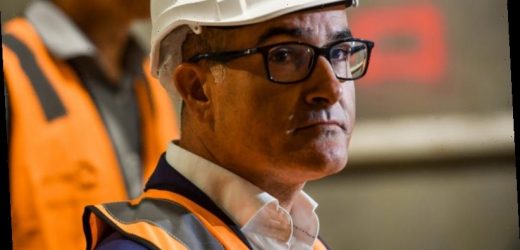The last time a state had an acting premier during a pandemic, things didn’t turn out so well.
In January 1919, West Australian Premier Henry Lefroy was in Melbourne for a conference of state leaders, leaving Hal Colebatch in Perth and in charge.
Henry Lefroy, former premier of Western Australia, was locked out of his state by his own acting premier at the height of the 1919 pandemic.
When the Spanish Flu broke out in Melbourne, Colebatch responded in what has become customary WA fashion, stopping an intercontinental train in its tracks and blocking anyone from crossing the state border from over east – including Lefroy.
Colebatch’s hardline stance was met with a surge in popularity and three months later, he replaced Lefroy as premier.
No one is expecting Victoria’s Premier James Merlino to try anything quite so bold while Daniel Andrews recuperates from a serious back injury. Nor can Mr Merlino, one of the Premier’s most loyal ministers, fill-in as passively as he normally would.
People who have sat around the Victorian Cabinet table when Mr Andrews is overseas on state business or on holidays say there is a convention where all significant decisions are deferred until the Premier is back in the room.
This time, Victoria needs Mr Merlino to be more than a placeholder.
Acting Premier James Merlino will invite more Cabinet discussion and brook more dissent than Daniel Andrews.Credit:Simon Schluter
Now that the severity of Mr Andrews’ injuries is becoming more clear – fractured ribs and damaged vertebrae following an early morning tumble at a Portsea property – his government is working on the assumption that the Premier won’t be back at his desk for at least one month and perhaps, several. In that time, many important decisions will need to be taken.
The next four weeks are crucial to framing the 2021 Budget. In the Premier’s absence, Mr Merlino will chair Cabinet and also meetings of the Expenditure Review Committee which is responsible for laying out the major themes of the Budget and weighing competing requests of government departments and agencies.
He also hopes to represent Victoria at National Cabinet meetings but Victoria must first secure the support of the Prime Minister and other state leaders who have previously denied acting premiers access to the nation’s peak COVID-19 decision-making forum.
The pandemic is still dominating Victoria’s policy agenda, with the state’s mothballed hotel quarantine system and proposed, alternative arrangements at Avalon and the vaccine roll-out at the top of the list of urgent matters to be resolved.
How will the government function without Mr Andrews?
At the very least, its inner workings will feel and look different. Where Andrews tends to focus Cabinet discussions by making clear his views from the outset, Mr Merlino is likely to invite more discussion and brook more dissent.
Where Mr Andrews, a Premier in his seventh year, has continuity in all key policy areas, Mr Merlino will need to be quickly brought up to speed before puts his signature to any substantial initiatives.
Government sources predicted the tempo of decision-making will slow and where possible, some decisions will be parked.
One government insider said Mr Merlino should consider relinquishing his portfolio responsibilities in education and mental health to enable him to focus his full attention on being Premier.
Government sources said Mr Merlino would not relinquish his portfolios but likely delegate some of his policy responsibilities. He will also work predominantly from the Premier’s first floor office in Treasury Place instead of his own office on the third floor.
Mr Andrews is not completely incapacitated. He will expect to be consulted on and influence major policy decisions. His chief of staff Lissie Ratcliffe and her deputy Jessie McCrone will ensure communications are kept open between his recovery bed, Mr Merlino and senior ministers.
Mr Merlino has declared the government will proceed as normal and he would continue to speak regularly to the Premier.
However, due to the nature of his injuries, Mr Andrews will be flat on his back and under the influence of pain killing medication. Anyone who has experienced a serious back injury will understand how difficult this makes it to use a computer, read lengthy materials in hard copy and do work of any kind.
This could create a tension between the political instincts of a workaholic Premier and the rest required for his recovery. If it gets to the point where Mr Andrews needs to be told for his own health to stop working, the task will likely fall to Ms Ratcliff, his most trusted staff member. As one government insider told The Age: “She will certainly have that short straw.”
The most powerful arms of a highly centralised state government bureaucracy — the Premier’s Private Office and the Department of Premier and Cabinet — have been directed to support Merlino and provide continuity of administration. This means that 60-odd staff within the PPO and the media advisers attached to all other ministers will answer to Mr Merlino.
ABC psephologist Antony Green says there are historic cases of acting premiers and prime ministers serving in those roles for many months.
Former Victorian premier William Watt served as acting prime minister for 16 months.
George Pearce was acting prime minister for seven months in 1916 when Billy Hughes made the sea voyage to England to press Australia’s interests in WWI. At the end of the war, when Hughes returned to Europe, William Watt, a former Victorian premier, filled in as PM for 16 months.
There are also instances when state premiers have resigned their commission due to a forced absence of parliament and been sworn back in on their return.
NSW premier Neville Wran followed this course in 1983 while the Street inquiry investigated and ultimately cleared him of any involvement in perverting the course of justice. Tasmania’s long-serving premier Robert Cosgrove stepped down in 1947 after he was charged with bribery and corruption. He returned as Premier two days after his acquittal.
Former NSW premier Neville Wran said he was “a little angry” after learning he’d been exonerated by a royal commission.Credit:Paul Mathews
Mr Green said he couldn’t recall an example of any premier standing down for illness.
“If Mr Andrews is not going to be well enough to be Premier for a while it is possible for him to step aside so someone can take the full authority of Premier, ” Mr Green said. “If he is off on sick leave they are still going to ring him up. He is going to find it very hard not to be involved.”
Government sources said there had been no contemplation of Mr Andrews stepping down.
Start your day informed
Our Morning Edition newsletter is a curated guide to the most important and interesting stories, analysis and insights. Sign up to The Sydney Morning Herald’s newsletter here, The Age’s here, Brisbane Times’ here, and WAtoday’s here.
Most Viewed in Politics
From our partners
Source: Read Full Article






